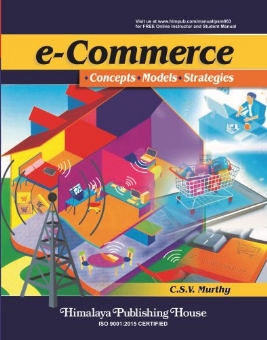E-Commerce – Concepts, Models and Strategies
no information available
The e-commerce market is booming worldwide in an unpredictable way growing year by year. Nowadays, people are making purchases from an innumerable number of e-commerce websites for online purchasing, online selling, online shopping, etc. Statistics show in US itself, that there is a substantial market, generated to an extent of US$ 392.5 billion in the year 2017 and this figure is expected to increase beyond $ 560 billion in the year 2019 (in retail sales). (Global e-commerce sales expected to reach in 2020 US$ 27 trillion worldwide). 59% of digital users are now able to innovate faster and 45% cite cost reduction as essential. The Indian e-commerce market is expected to grow to US$ 200 billion by 2026 and US$ 38.5 billion as of 2017. It is expected to jump from US$ 38.5 billion in 2017 to US$ 120 billion in 2020-2021, growing at an annual rate of 51% the highest in the world. As per recent research by McKinsey, it is estimated that using Internet of Things (IoT) also in e-commerce websites, will help in increasing revenues further. In US alone, it may go up to $1.25 trillion by the year 2025. To reach this stage, certain e-commerce development trends are inevitable which will be found beyond limits in the coming years. India is also going in a very big way to keep in pace with the world's market for all types of purchases like one-click purchase, virtual sales assistance, mobile shopping, digitalisation and with new technologies Internet-of-Things (IoT), messenger app, machine learning, data science, robotics etc. Likewise, e-commerce web development trends are also changing at a rapid pace and many businesses and brands have been recently started adopting these to stay competitive even in the Indian market. The industries coverage are: Financial services, Gaming Network, Healthcare, Manufacturing, Media and Entertainment, Pharmaceuticals, Public Sector, Retail, etc. Contents - 1. Exploring Electronic e-Commerce 2. Overview of Electronic Commerce 3. Driving the E-Commerce Revolution 4. Mobile Commerce / E-Commerce Marketplace 5. Internet, Intranets and Extranets 6. A. Internet and Extranets B. Portals C. Data Warehousing 7. A. Open System Interconnection (OSI) Model B. Extensible Markup Language (XML) C. Building Own Website 8. A. Electronic Commerce and Internet B. Electronic Market C. Electronic Business 9. A. Business-to-Business e-Commerce and Business Models B. Four Cs (Convergence, Collaborative, Computing, Content Management, Call Center) 10. Electronic Payment Systems 11. A. Internet Security B. Electronic Security 12. A. Supply Chain Management (SCM) B. Electronic Data Interchange (EDI) C. Wireless Application Protocol (WAP) 13. A. Customer Relationship Management (CRM) and Knowledge Management B. Business Intelligence and Knowledge Management 14. Digital World 15. A. Active Documents / Compound Documents B. E-Commerce Law and Legal Definition Glossary References Index ... Read more Read less











